-
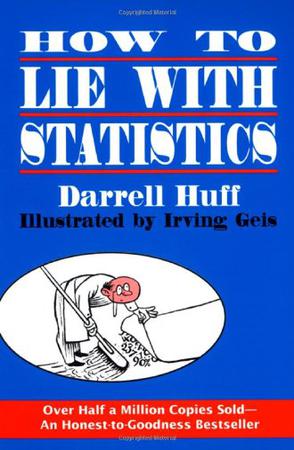
How to Lie With Statistics
"There is terror in numbers," writes Darrell Huff in How to Lie with Statistics. And nowhere does this terror translate to blind acceptance of authority more than in the slippery world of averages, correlations, graphs, and trends. Huff sought to break through "the daze that follows the collision of statistics with the human mind" with this slim volume, first published in 1954. The book remains relevant as a wake-up call for people unaccustomed to examining the endless flow of numbers pouring from Wall Street, Madison Avenue, and everywhere else someone has an axe to grind, a point to prove, or a product to sell. "The secret language of statistics, so appealing in a fact-minded culture, is employed to sensationalize, inflate, confuse, and oversimplify," warns Huff. Although many of the examples used in the book are charmingly dated, the cautions are timeless. Statistics are rife with opportunities for misuse, from "gee-whiz graphs" that add nonexistent drama to trends, to "results" detached from their method and meaning, to statistics' ultimate bugaboo--faulty cause-and-effect reasoning. Huff's tone is tolerant and amused, but no-nonsense. Like a lecturing father, he expects you to learn something useful from the book, and start applying it every day. Never be a sucker again, he cries! Even if you can't find a source of demonstrable bias, allow yourself some degree of skepticism about the results as long as there is a possibility of bias somewhere. There always is. Read How to Lie with Statistics. Whether you encounter statistics at work, at school, or in advertising, you'll remember its simple lessons. Don't be terrorized by numbers, Huff implores. "The fact is that, despite its mathematical base, statistics is as much an art as it is a science." --Therese Littleton -
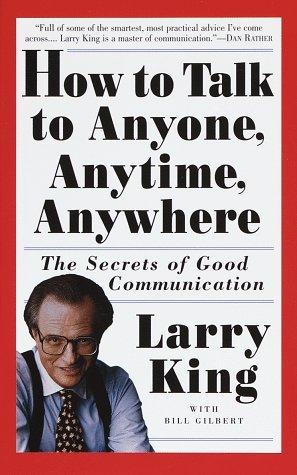
How to Talk to Anyone, Anytime, Anywhere
America's best-known master of conversation unveils his secrets for getting the talk flowing smoothly in any situation. "Communication is a necessary skill: Larry King is a master of communication, and now he's shared what he knows. If only he'd written the book sooner, I might have had a more interesting career."--Dan Rather. -

The Joy of Less, A Minimalist Living Guide
-
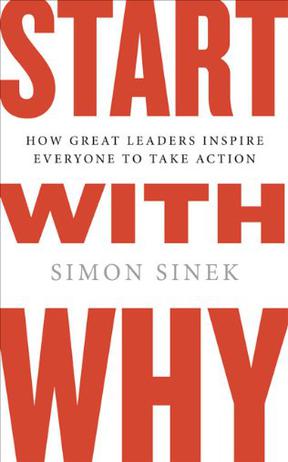
Start with Why
Why do you do what you do? Why are some people and organizations more innovative, more influential, and moer profitable than others? Why do some command greater loyalty from customers and employees alike? Even among the successful, why are so few able to repeat their success over and over? People like Martin Luther King Jr., Steve Jobs, and the Wright Brothers might have little in common, but they all started with why . It was their natural ability to start with why that enabled them to inspire those around them and to achieve remarkable things. In studying the leaders who've had the greatest influence in the world, Simon Sinek discovered that they all think, act, and communicate in the exact same way -- and it's the complete opposite of what everyone else does. Sinek calls this powerful idea The Golden Circle, and it provides a framework upon which organizations can be built, movements can be lead, and people can be inspired. And it all starts with WHY. Any organization can explain what it does; some can explain how they do it; but very few can clearly articulate why . WHY is not money or profit-- those are always results. WHY does your organization exist? WHY does it do the things it does? WHY do customers really buy from one company or another? WHY are people loyal to some leaders, but not others? Starting with WHY works in big business and small business, in the nonprofit world and in politics. Those who start with WHY never manipulate, they inspire. And the people who follow them don't do so because they have to; they follow because they want to. Drawing on a wide range of real-life stories, Sinek weaves together a clear vision of what it truly takes to lead and inspire. This book is for anyone who wants to inspire others or who wants to find someone to inspire them. -
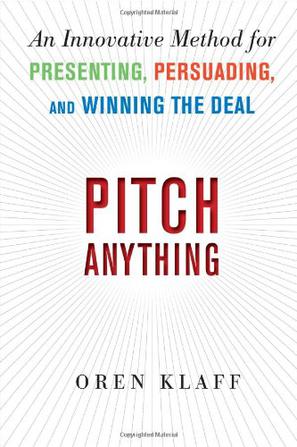
Pitch Anything
Gold Medal Winner--Tops Sales World's Best Sales and Marketing Book "Fast, fun and immensely practical." -JOE SULLIVAN, Founder, Flextronics "Move over Neil Strauss and game theory. Pitch Anything reveals the next big thing in social dynamics: game for business." -JOSH WHITFORD, Founder, Echelon Media "What do supermodels and venture capitalists have in common?They hear hundreds of pitches a year. Pitch Anything makes sure you get the nod (or wink) you deserve." -RALPH CRAM, Investor "Pitch Anything offers a new method that will differentiate you from the rest of the pack." -JASON JONES, Senior Vice President, Jones Lang LaSalle "If you want to pitch a product, raise money, or close a deal, read Pitch Anything and put its principles to work." -STEVEN WALDMAN, Principal and Founder, Spectrum Capital "Pitch Anything opened my eyes to what I had been missing in my presentations and business interactions." -LOUIE UCCIFERRI, President, Regent Capital Group "I use Oren's unique strategies to sell deals, raise money, and handle tough situations." -TAYLOR GARRETT, Vice President, White Cap "A counter-intuitive method that works." -JAY GOYAL, CEO, SumOpti About the Book: When it comes to delivering a pitch, Oren Klaff has unparalleled credentials. Over the past 13 years, he has used his one-of-a- kind method to raise more than $400 million-and now, for the fi rst time, he describes his formula to help you deliver a winning pitch in any business situation. Whether you're selling ideas to investors, pitching a client for new business, or even negotiating for a higher salary, Pitch Anything will transform the way you position your ideas. According to Klaff, creating and presenting a great pitch isn't an art-it's a simple science. Applying the latest findings in the field of neuroeconomics, while sharing eye-opening stories of his method in action, Klaff describes how the brain makes decisions and responds to pitches. With this information, you'll remain in complete control of every stage of the pitch process. Pitch Anything introduces the exclusive STRONG method of pitching, which can be put to use immediately: Setting the Frame Telling the Story Revealing the Intrigue Offering the Prize Nailing the Hookpoint Getting a Decision One truly great pitch can improve your career, make you a lot of money-and even change your life. Success is dependent on the method you use, not how hard you try. "Better method, more money," Klaff says. "Much better method, much more money." Klaff is the best in the business because his method is much better than anyone else's. And now it's yours. Apply the tactics and strategies outlined inPitch Anything to engage and persuade your audience-and you'll have more funding and support than you ever thought possible. -
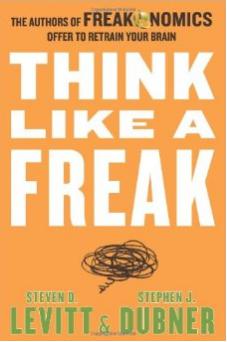
Think Like a Freak
Now, with Think Like a Freak, Steven D. Levitt and Stephen J. Dubner have written their most revolutionary book yet. With their trademark blend of captivating storytelling and unconventional analysis, they take us inside their thought process and teach us all to think a bit more productively, more creatively, more rationally—to think, that is, like a Freak. Levitt and Dubner offer a blueprint for an entirely new way to solve problems, whether your interest lies in minor lifehacks or major global reforms. As always, no topic is off-limits. They range from business to philanthropy to sports to politics, all with the goal of retraining your brain. Along the way, you’ll learn the secrets of a Japanese hot-dog-eating champion, the reason an Australian doctor swallowed a batch of dangerous bacteria, and why Nigerian e-mail scammers make a point of saying they’re from Nigeria. Some of the steps toward thinking like a Freak: First, put away your moral compass—because it’s hard to see a problem clearly if you’ve already decided what to do about it. Learn to say “I don’t know”—for until you can admit what you don’t yet know, it’s virtually impossible to learn what you need to. Think like a child—because you’ll come up with better ideas and ask better questions. Take a master class in incentives—because for better or worse, incentives rule our world. Learn to persuade people who don’t want to be persuaded—because being right is rarely enough to carry the day. Learn to appreciate the upside of quitting—because you can’t solve tomorrow’s problem if you aren’t willing to abandon today’s dud. #该内容由淘宝网-乐读书屋提供#http://l-books.taobao.com/